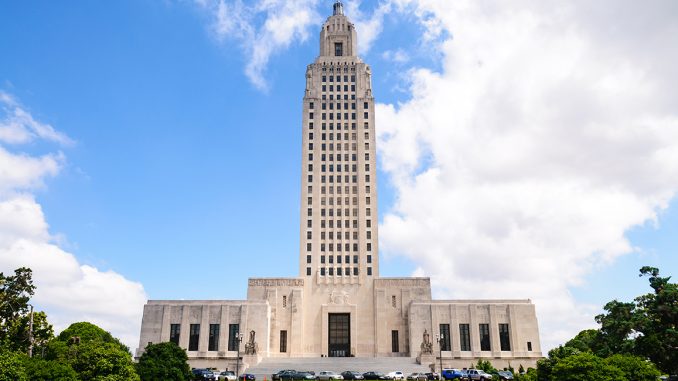
Louisiana has become the 20th state to protect minors from irreversible “transgender” procedures, including surgeries and cross-sex hormone injections, over the veto of its Democratic governor.
Members of the state legislature assembled in a special veto override session in Baton Rouge Tuesday to pass the Stop Harming Our Kids Act (H.B. 648), which prevents surgical or chemical conversion therapy to create an underage person’s “gender identity” that is “inconsistent with the minor’s sex.”
The bill forbids the “removal of any healthy or non-diseased body part or tissue”—such as mastectomies, hysterectomies, and sterilizations—and the construction of artificial breasts or genitalia. The bill also forbids placing children on puberty blockers or administering cross-sex hormone injections.
Gov. John Bel Edwards vetoed the bill on June 29, asserting it “needlessly harms a very small population of vulnerable children, their families, and their health care professionals.”
The legislature’s Republican supermajority then called a special veto override session where the child protections passed the state House of Representatives by a 76-23 vote—a larger margin than their initial passage on May 3. The bill then cleared the state Senate, 28-11. It takes effect on January 1.
Public health and child protection advocates cheered the outcome. “Detransitioner” Chloe Cole, who has lamented losing organs as a result of her teenage “transition,” noted the tremendous progress the state had made in one year. Before Tuesday’s vote, Louisiana stood as “the last state in the South that was sterilizing and cutting up children,” she noted.
“Last year, Louisiana tried to ban talk therapy for kids with [gender dysphoria]. As of today, Louisiana has done a full 180 and has now placed age restrictions that prevent what happened to me from happening to any child in the South,” she said. “To the Louisiana legislature, thank you so much for listening to my cautionary tale” and handing the Pelican State’s children a “major win!!”
Family Research Council also played a role in lobbying legislators to enact these child protections. Dr. Jennifer Bauwens, director of the Center for Family Studies at the Family Research Council, testified that lawmakers should ban “scientifically unsupported, highly invasive, and potentially irreversible interventions” for children whose brains have not yet fully developed—a process that ends in the early- to mid-20s.
In a letter to Louisiana State Senate President Page Cortez, a Republican, Family Research Council President Tony Perkins (himself a former Louisiana legislator) urged the senator to heed “valid medical evidence,” “tragic personal stories of regret by people who tried to medically ‘transition’ from their biological sex,” and “heartbroken parents” victimized by counselors and school personnel who “encouraged their children to ‘identify’ as something they can never be.”
The leaders of both chambers of the state legislature met with dozens of pastors for a time of prayer and to hear their concerns as the veto override session came into session, Gene Mills of the Louisiana Family Forum told “Washington Watch with Tony Perkins” on Monday. “We had robust participation from the public today here at the Capitol, and I appreciate how involved average citizens have been in our important discussions this year,” said Speaker of the House Clay Schexnayder.
In the end, six House Democrats joined all of that chamber’s Republicans on Tuesday’s veto override: Reps. Roy Daryl Adams of Jackson, Robby Carter of Amite, Chad Brown of Plaquemines, Mack Cormier of Belle Chasse, C. Travis Johnson of Vidalia, and Dustin Miller of Opelousas.
Two Democratic state senators also crossed the aisle: Katrina Jackson of Monroe and Greg Tarver of Shreveport.
Two Democratic state legislators, Reps. Francis Thompson and Jeremy LaCombe, switched parties to the GOP due, in part, to the governor’s position on the Stop Harming Our Kids Act.
U.S. Rep. Mike Johnson, R-La., offered his “congrats to my former colleagues in the Louisiana legislature who stood up for children today” and assured “children will not be mutilated in the South.”
The State Freedom Caucus Network called the override “a major victory to protect children.”
The bill makes an exception for children who enter puberty too early, for those born intersex, or who require such actions to treat a separate physical injury.
Edwards, who tried to kill the bill in a procedural move during the legislative session, said on Tuesday, “I expect the courts to throw out this unconstitutional bill.” Yet U.S. District Judge David Hale, an Obama appointee, allowed a Kentucky bill protecting children from transgender procedures to take effect last Friday.
The veto override session is the state’s third since 1974—all in Edwards’ second term as governor. The override puts Edwards in the history books as the only modern Louisiana governor to have lawmakers override more than one veto.
Lawmakers previously had a showdown with Edwards over the Fairness in Women’s Sports Act, which prohibits men from competing against women in most sports activities. Edwards allowed the law to take effect without his signature after a strong bipartisan coalition of legislators, led by sponsor State Sen. Beth Mizell, a Republican, passed the bill with enough votes to override his veto. The governor called that bill “very distressing” and “mean-spirited.”
Nearly two-thirds of Americans (61%) say males should not be allowed to compete in women’s K-12 and collegiate sports.
In addition to the 20 states that have signed such bills, similar bills have passed three additional states.
This piece originally appeared in The Washington Stand.
The Daily Signal publishes a variety of perspectives. Nothing written here is to be construed as representing the views of The Heritage Foundation.
Have an opinion about this article? To sound off, please email letters@DailySignal.com, and we’ll consider publishing your edited remarks in our regular “We Hear You” feature. Remember to include the URL or headline of the article plus your name and town and/or state.

